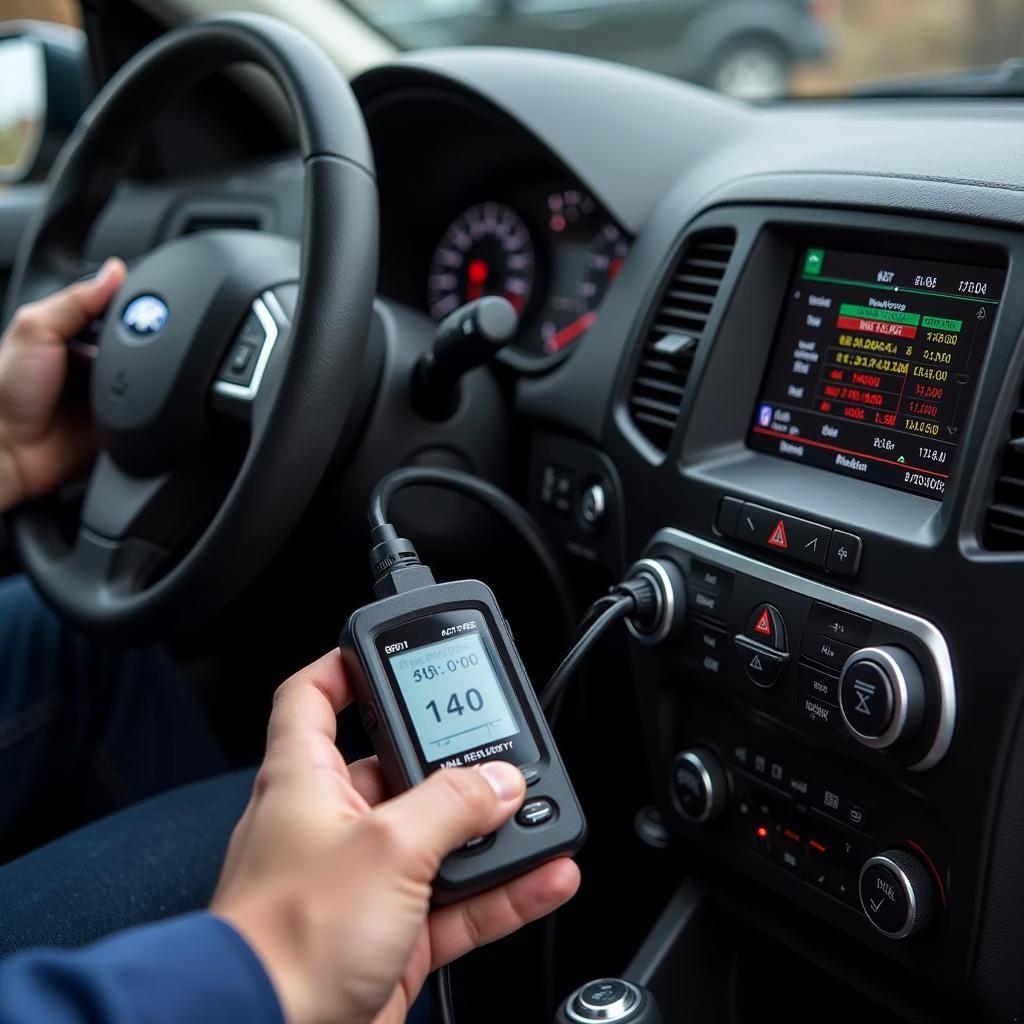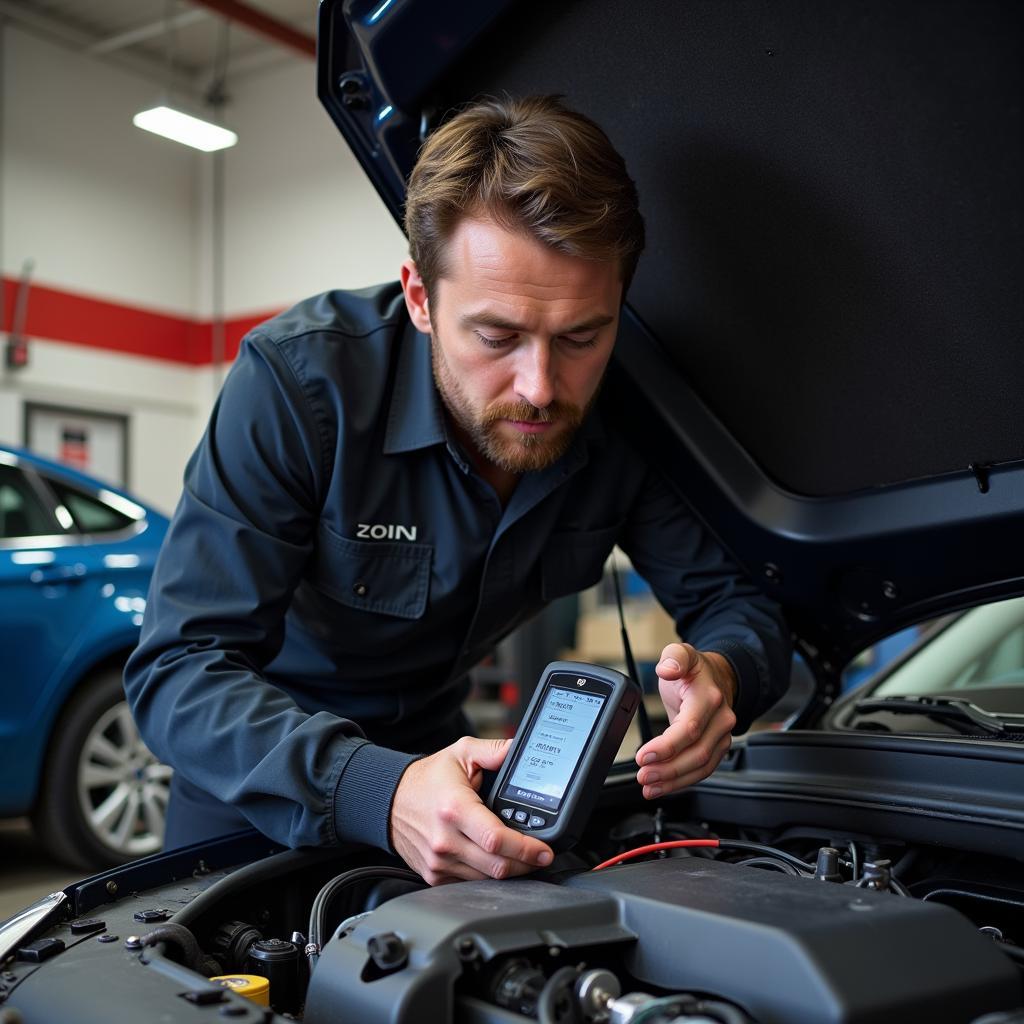In the realm of automotive repair and maintenance, a universal car diagnostic scanner has become an indispensable tool for both professionals and car enthusiasts. Whether you’re a seasoned mechanic or a car owner looking to troubleshoot those pesky engine lights, having the Best Universal Car Diagnostic Scanner at your disposal can save you time, money, and unnecessary headaches.
Why You Need a Universal Car Diagnostic Scanner
Gone are the days of relying solely on mechanics for even the simplest of car diagnostics. A universal car diagnostic scanner empowers you to:
- Read and understand those cryptic engine codes: Decipher the meaning behind those confusing dashboard warning lights.
- Diagnose engine problems: Identify the root cause of performance issues, misfires, or other engine-related problems.
- Monitor real-time vehicle data: Keep tabs on critical parameters like engine speed, coolant temperature, and oxygen sensor readings.
- Reset maintenance reminders: Clear those annoying “service engine soon” lights after routine maintenance.
- Save money on expensive repairs: Early detection of issues can prevent minor problems from escalating into major (and costly) repairs.
 Mechanic using a universal car diagnostic scanner on a car dashboard
Mechanic using a universal car diagnostic scanner on a car dashboard
Key Features to Consider When Choosing a Universal Car Diagnostic Scanner
Navigating the world of car diagnostic scanners can be overwhelming, especially with the plethora of options available. Here are the key factors to keep in mind when making your decision:
1. OBD-II Compatibility
Ensure the scanner you choose is compatible with the OBD-II (On-Board Diagnostics II) standard, which is mandatory for all vehicles manufactured after 1996.
2. Code Reading and Clearing
At the very least, your scanner should be able to read and clear both generic (P0XXX) and manufacturer-specific trouble codes.
3. Live Data Streaming
The ability to view real-time data from your car’s various sensors is essential for effective troubleshooting. Look for scanners that offer customizable data streams and graphical representations.
4. Additional Features
Consider scanners that offer advanced features such as:
- ABS (Anti-lock Brake System) Diagnostics: Identify issues with your ABS system.
- SRS (Airbag) System Diagnostics: Diagnose problems with your airbag system.
- Transmission Diagnostics: Analyze data from your car’s transmission.
- Bi-directional Control: Test components like actuators and solenoids.
5. User Interface and Ease of Use
Opt for a scanner with an intuitive user interface, clear navigation, and a well-organized menu system.
6. Brand Reputation and Support
Choose scanners from reputable manufacturers known for their quality and reliability. Check for available software updates and customer support options.
“When recommending a scanner, I always prioritize user-friendliness,” says John Miller, a seasoned automotive technician with over 20 years of experience. “A scanner should simplify the diagnostic process, not complicate it.”
Understanding the Different Types of Universal Car Diagnostic Scanners
1. Basic Code Readers
These entry-level scanners are ideal for DIYers and car owners looking for a budget-friendly option. They typically offer basic code reading and clearing capabilities.
2. Mid-Range Scanners
A step up from basic code readers, mid-range scanners offer additional features like live data streaming, some advanced diagnostics, and may come with software for PC connectivity.
3. Professional-Grade Scanners
These high-end scanners are designed for professional mechanics and offer a comprehensive suite of features, including advanced diagnostics, bi-directional control, and extensive coding capabilities.
best cheap car diagnostic scanner
Tips for Using a Universal Car Diagnostic Scanner
- Locate the OBD-II Port: This 16-pin connector is typically located under the dashboard on the driver’s side.
- Turn the Ignition On: Turn the key to the “on” position without starting the engine.
- Connect the Scanner: Plug the scanner into the OBD-II port.
- Read the Codes: Follow the scanner’s instructions to read the trouble codes stored in the car’s computer.
- Research the Codes: Look up the codes online or consult your vehicle’s service manual to understand their meaning.
- Clear the Codes: After addressing the underlying issue, use the scanner to clear the codes and reset the check engine light.
 A mechanic is using a universal car diagnostic scanner to diagnose a car’s engine problem.
A mechanic is using a universal car diagnostic scanner to diagnose a car’s engine problem.
Conclusion
Investing in the best universal car diagnostic scanner is a wise decision for any car owner or automotive enthusiast. From simple code reading to advanced diagnostics, a quality scanner empowers you to take control of your car’s health, saving you time and money in the long run. Remember to consider your specific needs, budget, and desired features when making your choice.
FAQs
Q: Will a universal scanner work on my car?
A: Most likely, yes. Universal scanners are designed to work with the OBD-II standard, which is mandatory for all vehicles manufactured after 1996.
Q: Can I use a scanner to reset my car’s oil light?
A: Yes, most scanners allow you to reset maintenance reminders, including oil life monitors.
Q: What’s the difference between a code reader and a scanner?
A: Code readers only read and clear codes, while scanners offer additional features like live data streaming and advanced diagnostics.
Q: Do I need a professional-grade scanner?
A: Unless you’re a professional mechanic, a mid-range scanner should suffice for most DIYers and car owners.
Q: Can a scanner fix my car?
A: No, scanners only diagnose problems. They don’t fix them. You’ll still need to address the underlying issue.
Need More Help?
For more information on car diagnostic tools and expert advice, explore our other helpful resources:
- best car diagnostic tool 2013
- best car diagnostic tool 2015
- best value car diagnostic tool uk
- best car odb diagnostics tool and app
Still have questions? Our team of car diagnostic experts is always here to help! Reach out to us via WhatsApp: +1(641)206-8880 or Email: [email protected]. We offer 24/7 customer support to assist you with all your car diagnostic needs.

Leave a Reply